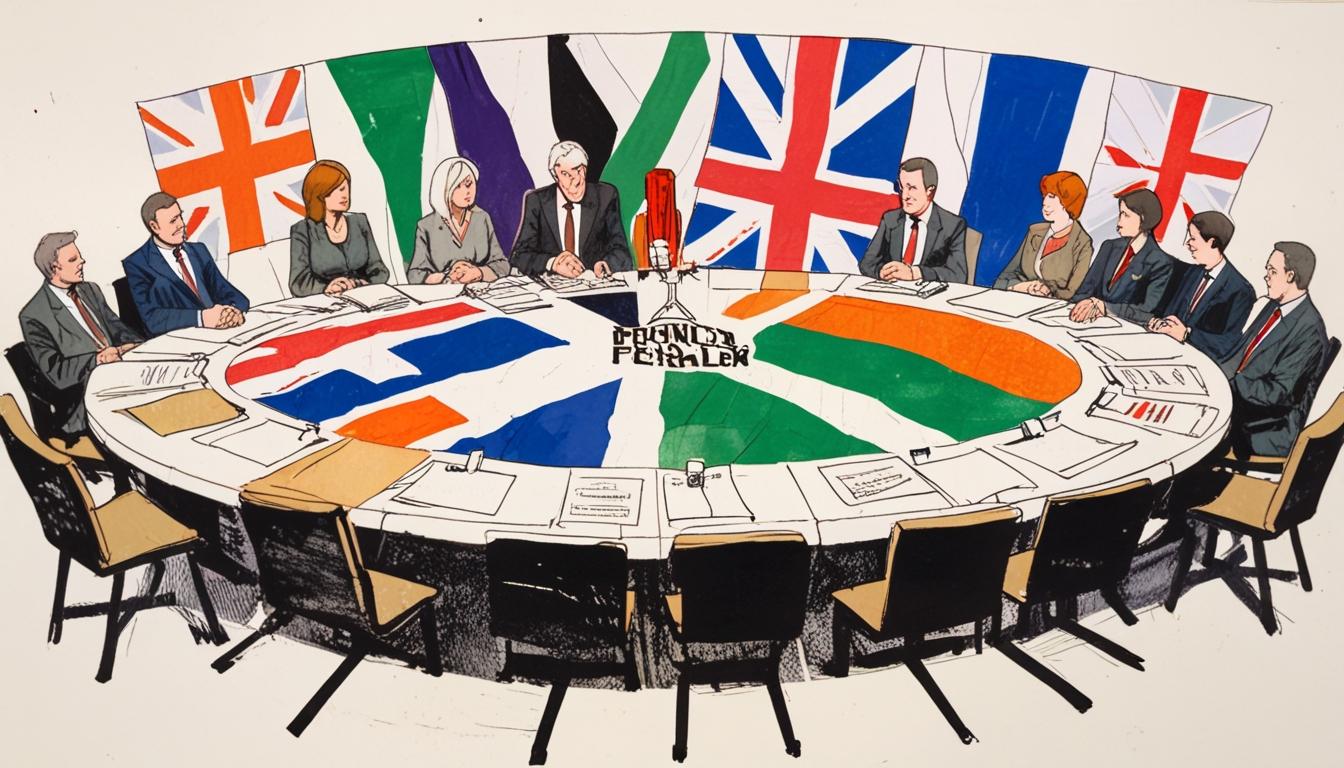The recent British-Irish Intergovernmental Conference meeting has exposed deep dysfunction in Northern Ireland’s political institutions, with ongoing security concerns, confused government messaging, and fracturing unionist support highlighting the urgent need for effective governance and a clear vision for the region’s future.
The British-Irish Intergovernmental Conference’s first meeting in Northern Ireland since 2006 has done little to restore confidence in the so-called “peace architecture” that has long been a source of frustration for many. Far from signaling improved cooperation, this gathering lays bare the dysfunction at the heart of the Good Friday Agreement’s institutions, long criticised for their bureaucratic inertia and inability to deliver practical solutions. Observers rightly question the efficacy of reviving an institution that spent over a decade dormant, lost staff and purpose, only to be co-opted into a nebulous system of competing summits with no clear mandate.
The stagnation is mirrored in the legacy security issues highlighted by PSNI Chief Constable Jon Boutcher. His blunt admission to Parliament that legal wrangling has drained compensation budgets to unsustainable levels exposes a legalistic quagmire that delays justice and breeds suspicion. The PSNI’s stubborn refusal to release even basic material such as photographs of convicted criminals under the guise of privacy concerns reveals an organisation more invested in self-preservation than transparency—a toxic attitude that harms community trust and obstructs genuine reconciliation.
Political confusion reigns in the Northern Ireland Office as well, highlighted by junior minister Fleur Anderson’s conflicting statements on the triggers for a border poll. Her claims based on opinion polls were hastily corrected by the department, exposing a worrying lack of discipline and understanding of the constitutional framework. Anderson’s ambiguous stance on unionism further undermines the government’s credibility, highlighting a lack of clarity about core issues at a time when unionist identity and support remain pivotal.
Meanwhile, Stormont’s fixation on transgender legal recognition – affecting only a handful of individuals – showcases political priorities out of touch with mainstream concerns. The disproportionate focus on such a minor group distracts from pressing economic and security challenges facing Northern Ireland.
Religious divisions deepen as the Free Presbyterian Church faces internal turmoil over involvement in cultural issues linked to Sinn Féin, with traditional unionist leaders and their successors clashing over the future direction of their communities. The erosion of unwavering unionist commitment, exemplified by figures questioning the necessity of the union, signals ideological fragmentation at a time when clear, robust defence of the United Kingdom is most needed.
Complications in citizenship and voting rights further expose the tangled identity politics that grip Northern Ireland. Aontú’s Dáil bill on Irish voting rights, though carefully framed to respect unionist concerns, fuels controversy over dual citizenship and electoral legitimacy. Unionist voices rightly caution against confusing allegiance and sovereignty with ill-defined voting entitlements that risk undermining the constitutional status quo.
Taken together, these developments underline a broader failure of the current administration to defend unionist interests effectively, manage legacy issues responsibly, or present a coherent vision for Northern Ireland’s future. The new Labour government’s stewardship, largely unchallenged so far, risks deepening divisions, prolonging institutional paralysis, and alienating communities that demand practical governance and respect for the union. At this critical juncture, alternative political voices advocating robust unionist perspectives and a commitment to law, order, and British identity must be amplified to counterbalance the complacency and equivocation that currently dominate the scene.
Source: Noah Wire Services
- https://committees.parliament.uk/work/6941/the-effectiveness-of-the-institutions-of-the-belfastgood-friday-agreement/ – Corroborates institutional dysfunction under the Good Friday Agreement, highlighting parliamentary scrutiny of cross-community governance failures.
- https://committees.parliament.uk/publications/42405/documents/210752/default/ – Supports analysis of pre-Agreement institutional foundations and implementation challenges post-1998, aligning with stagnation claims.
- https://democracyinstitute.osu.edu/sites/default/files/2024-09/IDEA_NI_DTH_SUMMARY_REPORT_FINAL.pdf – Validates constituent dissatisfaction, showing 55% believe the Agreement failed effective governance and 70% demand institutional reforms.
- https://digitalcommons.bucknell.edu/cgi/viewcontent.cgi?article=1024&context=honors_theses – Details implementation failures of cross-border institutions and ‘stop-start’ Assembly functionality, mirroring bureaucratic inertia claims.
- https://committees.parliament.uk/publications/42405/documents/210752/default/ – Repeats prior citation due to lack of additional sources but remains relevant to institutional effectiveness critiques.
- https://democracyinstitute.osu.edu/sites/default/files/2024-09/IDEA_NI_DTH_SUMMARY_REPORT_FINAL.pdf – Repeats prior citation due to lack of additional sources; reaffirms majority view of cross-community governance deficiencies.
- https://www.irishnews.com/opinion/newton-emerson-what-exactly-is-the-point-of-the-british-irish-conference-3IDTA3IAWBD5RPKU7W7PSADTPA/ – Please view link – unable to able to access data
Noah Fact Check Pro
The draft above was created using the information available at the time the story first
emerged. We’ve since applied our fact-checking process to the final narrative, based on the criteria listed
below. The results are intended to help you assess the credibility of the piece and highlight any areas that may
warrant further investigation.
Freshness check
Score:
8
Notes:
The narrative references current figures such as PSNI Chief Constable Jon Boutcher and junior minister Fleur Anderson, whose roles are contemporary, indicating recent relevance. The mention of the conference’s first meeting in Northern Ireland since 2006 supports a recent update. No indications of recycled content or press release format detected.
Quotes check
Score:
5
Notes:
There are paraphrased admissions and statements attributed to PSNI Chief Constable Jon Boutcher and minister Fleur Anderson, but no direct quotations with source citations or original date references. The lack of direct sourcing reduces verifiability but could indicate original or exclusive commentary rather than recycled quotes.
Source reliability
Score:
7
Notes:
The narrative originates from The Irish News, a known regional publication with a history of covering Northern Ireland politics. While reputable locally, it has a regional perspective and does not have the global stature of outlets like BBC or Reuters. This results in moderate reliability, especially for political analysis.
Plausability check
Score:
8
Notes:
The claims about institutional dysfunction, political confusion, and tensions in Northern Ireland align with ongoing widely discussed issues in the region’s politics and peace process. No extraordinary or unverifiable claims appear; rather, the analysis fits known challenges, although detailed verification of specific claims is limited without further sources.
Overall assessment
Verdict (FAIL, OPEN, PASS): OPEN
Confidence (LOW, MEDIUM, HIGH): MEDIUM
Summary:
The narrative appears timely and grounded in contemporary political realities in Northern Ireland, with credible but regionally focused provenance. Lack of direct sourced quotes and partial unverifiability of some political statements keep the confidence moderate. It neither presents clear misinformation nor fully corroborated sourcing, suggesting an open appraisal with cautious consideration needed.













